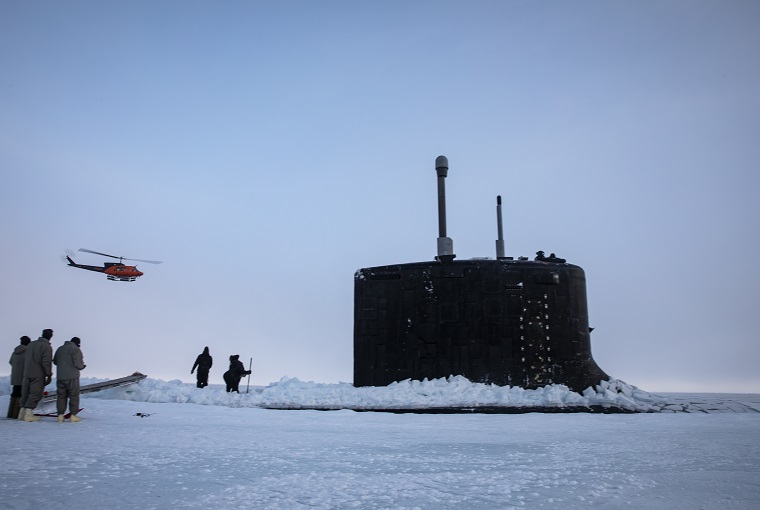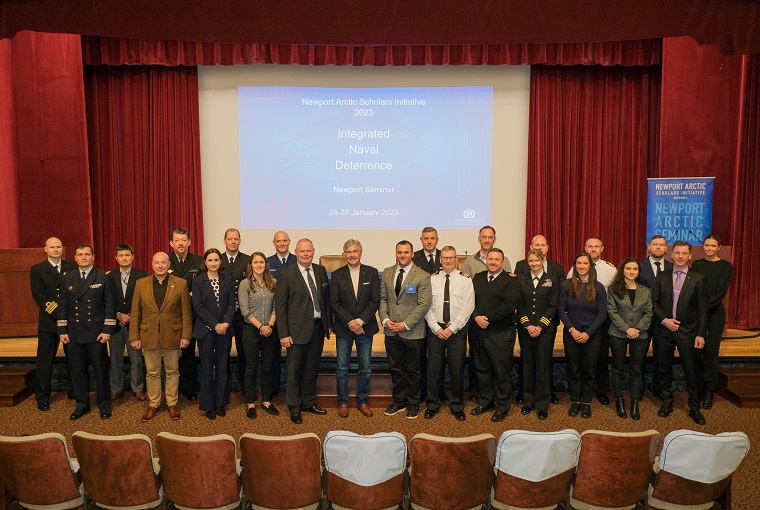U.S. Naval War College's 2023 Newport Arctic Scholars Study Integrated Naval Deterrence in the Arctic Region

Newport, R.I. – Access and influence. Information and intelligence. Energy dominance. Control of new sea routes. These are some of the intangibles that have sparked fierce competition in the Arctic region among the world’s most powerful nations: Russia, China, and the United States–to name a few. Control of these intangibles through military aggression and gray-zone tactics impacts the U.S., U.S. allies, and ultimately our democratic way of life. Thus, the Newport Arctic Scholars Initiative (NASI) commenced its opening seminar held January 24–26, 2023 in Newport, Rhode Island, to explore ways international navies and coast guards can strengthen cooperation to deter acts of military aggression and harmful influence in the Arctic maritime region.

For over a century, the U.S. Naval War College (NWC) has challenged thousands of world leaders to study questions related to war, the statesmanship connected to war, and the prevention of war. With a focus on the latter, NASI brings together naval officers and scholars from Arctic nations to study and report on critical questions posed by Arctic heads of Navy. At last year’s final NASI seminar in Copenhagen, senior representatives conceded that maintaining regional stability demands a renewed focus on strengthening integrated naval deterrence and that navies and coast guards of like-minded non-Arctic states will play an increasingly important role and must be part of the solution.
The 25 sailors and scholars selected for this year’s NASI cohort hail from Canada, Denmark, Finland, Iceland, Norway, Sweden and the United States—and for the first time—France, the UK, and Japan (as an observer). During the three-day workshop, participants took part in panel discussions and working groups to develop options for integrated deterrence in the areas of denial, resilience, and cost imposition. Former Secretary of the Navy Kenneth J. Braithwaite and Vice Admiral Daniel Dwyer, commander, Second Fleet/commander, Joint Forces Command Norfolk provided remarks.
Professor Lars Saunes, retired chief of the Royal Norwegian Navy and current Chief of Naval Operation’s distinguished international fellow and NASI co-lead scholar contends that the need for a research study of this nature is not without cause due in part to Russia’s illegal war into Ukraine, increased friction between NATO and Russia, and the wild card--China.
“Arctic exceptionalism is gone, and tension is rising,” said Saunes. “Consequently, there is a potential for horizontal escalation in the Arctic never before seen, and the role and influence of seapower remains front and center.”
The work of the NASI 2023 scholars resonates at individual levels for countries facing complexities brought on by a more accessible Arctic and the likelihood of economic vitality and comes even as Sweden and Finland look to join NATO.
“Sweden is located at a geo-strategic crossroads on the Scandinavian Peninsula,” said Cdr. Stefan Lundqvist, Ph.D., pro-dean at the Swedish Defense University. “Our invitee status with NATO will deepen our cooperation with the U.S. and the Nordic countries, which will help ensure freedom and security for all allied nations.” Lundqvist maintains that the NASI 2023 conference fostered an inclusive approach to highlighting issues and finding cost-effective solutions to the various challenges.
The importance and impact of the project is also felt on a personal level, however. For Amelie Theussen, Ph.D., an associate professor at the Royal Danish Defense College, the workshops gave a greater understanding of integrated deterrence, how that affects navies, and the contributions naval forces can make to the subject matter.
“It’s a fantastic network to draw on each other’s expertise and positions for a deeper understanding of the various interests in the Arctic, particularly the maritime domain, so we can collaborate on how to best achieve them [our collective interests],” said Theussen.
Walter Berbrick, DLP, NASI co-lead scholar and associate professor in the War Gaming Department, agrees. For him, NASI’s focus on integrated naval deterrence is a unique opportunity to bring sailors and scholars together to collaborate, listen and learn from one another, and develop enduring partnerships. “It’s reciprocal really,” said Berbrick. “At the end of the day, we inform each other’s policies and strategies, make a positive and meaningful impact, and develop ourselves further as lifelong learners and friends.”
NASI scholars will examine these options through a two-sided, professionally facilitated seminar-style war game later this spring and present their findings and recommendations to heads of navies at the International Seapower Symposium this fall.
